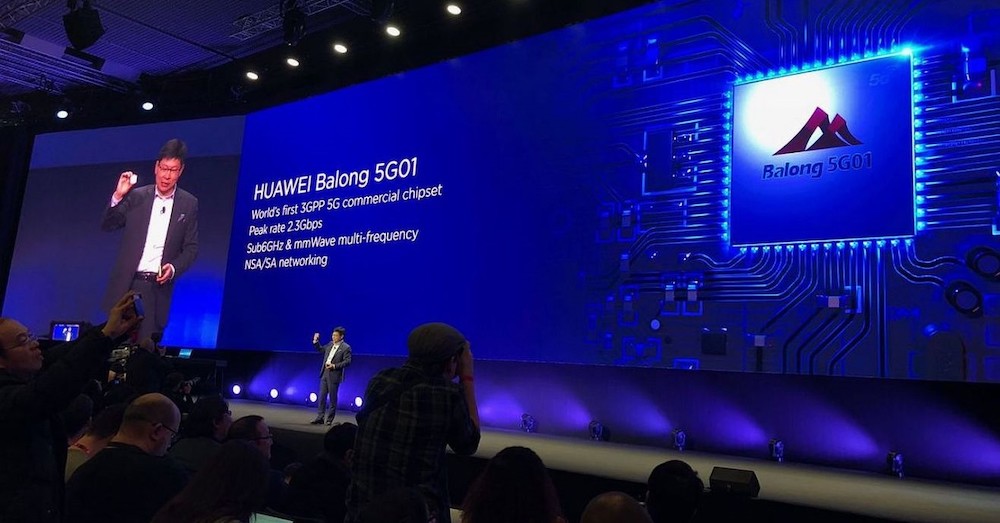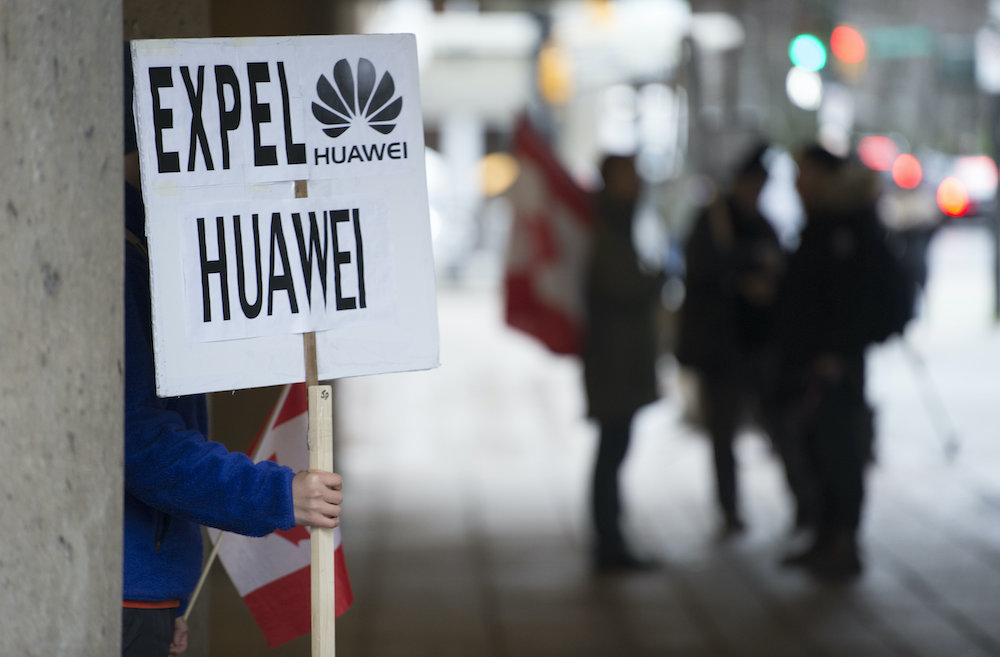The extradition hearing for Huawei top executive Meng Wanzhou (a.k.a. Sabrina Meng) grabbed attention in Vancouver last week, with more to come in June. The case pops in and out of view. The details might seem irrelevant to those of us who don’t inhabit the tech biz stratosphere.
Just remember that Huawei, like every colossus from Amazon to Alibaba, hopes to disarm Canadians with aggressive charm. Huawei’s story, the only one it wants Canadians to hear, is this unbelievable heartbreaker:
Sabrina Meng, Huawei’s trusted CFO and daughter of its billionaire founder Ren Zhengfei, was on her way to Mexico to champion 5G technology when she got unfairly arrested at the Vancouver airport.
Meng, a glorious global leader of the next phase of the internet revolution, is entirely innocent of fraud, as charged by the U.S. Justice Department.
Moreover, the company denies operating a shadow company in Iran that violated U.S. sanctions against that country.
In fact, Canadians should regard the whole Trumpian affair as "contrary to the rule of law."
We also are to pity Meng, because she has been confined to one of her two multimillion-dollar Vancouver mansions and must wear a GPS bracelet along with her Jimmy Choo stilettos. How merciless!
We are to forget that the Chinese Communist Party, in retaliation for the arrest of Meng, jailed two Canadians and holds them in solitary confinement. They also turned a jail term for another Canadian into a death sentence.
We are told that Huawei considers these arrests to be unfortunate, but "these are not issues for a tech company to get involved in," said Alykhan Velshi, Huawei’s Canadian VP of corporate affairs, to CBC’s the Current earlier this week.
The idea that Huawei operates like an arm of the Chinese government is silly, said Velshi.
Huawei Canada does its own thing. "We have been operating in Canada for 10 years," he added.
Now comes the part of the story that wants us to accept that technological progress can’t be stopped or challenged.
First, we are to believe that Huawei is just another company like Facebook and Google with nothing but purity in their corporate hearts and dedicated to the gods of convenience and efficiency.
Huawei does, after all, lead the globe in developing 5G technology, which will connect all digital devices and accelerate the progress of artificial intelligence and robots.
Do not believe, say the Chinese, that 5G technology can serve as a Trojan horse for their totalitarian state to spy on Canadians.
If there happens to be a bug or a backdoor in the technology, well, "there is a technological solution," because 5G technology is just a "technology issue," said Velshi.
If Canada were to ban Huawei’s 5G technology and stand in the way of progress, Canadians would become "laggards." Nobody wants to be a laggard.
Huawei would like you to know that it makes neutral technologies that connect and enrich people’s lives.
If that technology is used to help conduct surveillance on millions of Chinese Uighurs, Huawei isn’t responsible for the application.
"We sell technology all around the world, but we don't operate it. We don't know how our customers choose to operate it," Velshi explained to the Current.
Last but not least, Huawei is a nice company that sponsors Canadian hockey games and works diligently with our universities.
You can’t stop globalization by walling off Huawei and 5G technology.
Let’s expose these lies.
About 40 per cent of the world’s population is now enmeshed in cellular systems designed by Huawei. The company earns $108 billion a year and employs nearly 200,000 people. The Communist Party of China has 300 committees embedded in the company.
As a consequence, Huawei is not just another technology firm (no such fiction exists anywhere) but a manifestation of the imperial goals of the Chinese government, which is committed to winning a global war in artificial intelligence.
Every day the Chinese state already uses a variety of technologies, including systems made by Huawei that support facial recognition, to limit dissent and expand its Social Credit System.
The Social Credit System consists of constant state surveillance of people’s shopping, watching and even walking habits that creates a computational score. The Big Brother score allows the state to assess the trustworthiness of its citizens. With the help of an algorithm, the state can deny a shiftless citizen travel or credit.
As the machinations of Facebook and Google have proven, no technology can be free of the encoded bias of its makers, let alone the tendency of technology to erode human freedom overtime.
Last year, the Australian Strategic Policy Institute deftly mapped out the political role that China’s tech companies play at home and abroad.
The Australian report, which Canadian politicians should read, spoke bluntly. "China’s ambitions to influence the international development of technological norms and standards are openly acknowledged."
It added, "The [Chinese Communist Party] recognises the threat posed by an open internet to its grip on power — and, conversely, the opportunities that dominance over global cyberspace could offer by extending that control."
As such, Huawei has played a prominent role in making world a more insecure and totalitarian place.
The Australian report, for example, documents how Huawei has erected scores of so-called Smart City Public Security projects around the world.
"Those projects — which are often euphemistically referred to as ‘safe city’ projects — include the provision of surveillance cameras, command and control centres, facial and licence plate recognition technologies, data labs, intelligence fusion capabilities and portable rapid deployment systems for use in emergencies."

The company has also been supplying video surveillance and analysis systems to the dictator of Belarus in Europe. And it has enabled the surveillance of millions of Uyghurs in Xinjiang province by providing security forces with technical support and training.
The real story takes another unhappy turn.
The Wall Street Journal recently documented how Huawei technicians that were embedded in the cybersecurity operations of two African states helped those government spy on their political critics. (Huawei denies the charge.)
Last year, the Financial Times described the growing global reach of China’s digital authoritarianism.
Chinese tech companies, among the largest and most innovative in the world, are now throwing their weight around at the UN’s International Telecommunication Union (ITU).
That means that China Telecom, TZE, Huawei and China’s surveillance camera giants are now setting global standards for the total surveillance of people in cities. In effect, the Chinese fox is now wiring parts of the global henhouse for happy surveillance.
Given these unsettling developments, Huawei’s claim to be a neutral player is absurd. Every company in China, whether private or state owned, serves the interests of the Communist Party.
In 2017 President Xi Jinping, a dictator in all but name, passed the National Intelligence Law. It doesn’t hide the state’s intentions. The law requires any company to co-operate with state intelligence work and to keep that work secret. The law makes every Chinese company operating abroad a potential Trojan horse.
Even long-time promoters of better Chinese-Canadian relations can see the writing on the wall. "It would be folly to hand the keys to our national infrastructure to what is effectively a Chinese State Owned Enterprise," argues Margaret McQuaig-Johnston, a senior fellow at the University of Ottawa.
Richard Fadden, former security advisor to the prime minister, goes further. "If China would resort to putting Canadians to death to defend its corporate national champion, what might it do if the Chinese Communist Party had unfettered access to Canada’s vital communications networks? "
Last but not least comes the issue of 5G technology itself.
The issue is just not about the security of the system, but the tyrannical nature of the entire system itself. Whether engineered by Huawei or Nokia, 5G cinches the technological noose on every aspect of human life.
To date, each new development in cellular phone networks has offered a novelty along with increased security risks: 2G offered texting and spam; 3G boosted speeds and introduced wireless threats; 4G delivered streaming and created a "dynamic threat landscape."
Now 5G promises to accelerate artificial intelligence by linking a complex network composed of "drones and air traffic control, cloud-driven virtual reality, connected vehicles, smart factories, cloud-driven robots, transportation and e-health."
5G, the equivalent of a colonial occupying force, requires the rollout of a massive infrastructure of wireless base stations, because it operates on wavelength frequencies that can’t travel far without assistance.
Contrary to Huawei’s assurances, computer researchers have repeatedly warned that "new types of security threats and challenges will arise along with the deployment of novel 5G technologies and services," because 5G makes the whole system easier to hack.
Meanwhile, the political status quo fails to signal the need for caution. Instead, citizens are told we should welcome each new technology as a great liberator delivering us shiny conveniences and efficiencies.
But who feels liberated? Successive waves of gadgets and their networks have eroded our freedom, abolished our privacy, undermined our democracies and blunted our spirits with algorithms designed to make people more predictable and docile.
James Bridle, a powerful critic of this state of affairs, argues that the uncritical belief in technology’s amoral utility "perpetuates our inability to rethink our dealings with the world."
Such thinking weakens our resistance, but resistance is all that we have left.
What is clear is that Canada must follow Australia and New Zealand and ban Huawei from 5G infrastructure.
That’s only a first step. Canada must also establish a national office to assess all emerging technologies regardless of national origin and their threats to democracies.
China, which has no belief in freedom, has mastered a technology whose wind fills the sails of tyranny.
Huawei is just one of many interconnected high-tech firms trying to make the world a better place for machines and machine thinking.
The U.S., a failing democracy destabilized by its technologies such as Facebook, has fallen behind in this new cold war.
It has no real strategy on how to retain its tentative grip on global communications other than trying to impede Huawei.
Wired reporter Garrett Graff argues the dispute "could calve the world into two separate tech ecosystems, one in North America and parts of Europe and the other across Asia and the Southern Hemisphere. The former would be dominated by Nokia, Amazon, Google, Facebook, Microsoft, and Apple, and the latter by Huawei, Alibaba, Tencent, and Baidu."
And that is now happening.
Robert Spalding, a former brigadier general in the U.S. Air Force and a member of the National Security Council, has studied 5G technology for years.
Given its threatening nature, he once advocated that the U.S. should build an "Eisenhower National Highway System for the Information Age," that reflected an appreciation for freedom as opposed to the Chinese Communist Party’s declared preference for authoritarianism.
The idea went nowhere in the Trump regime.
Spalding, who now works at the Hudson Institute, doesn’t think ordinary people appreciate the danger now pulsating through their smart phones. The danger is "existential to democracy" when "allowing totalitarian regimes — or any government — full knowledge of everything you do at all times," he said.
"Because the tendency is always going to be to want to regulate how you think, how you act, what you do. The problem is that most people don’t think very hard about what that world would look like."
And that’s the story Huawei doesn’t want you to believe. Or share. Or even think about. ![]()
Read more: Media, Science + Tech
















Tyee Commenting Guidelines
Comments that violate guidelines risk being deleted, and violations may result in a temporary or permanent user ban. Maintain the spirit of good conversation to stay in the discussion.
*Please note The Tyee is not a forum for spreading misinformation about COVID-19, denying its existence or minimizing its risk to public health.
Do:
Do not: